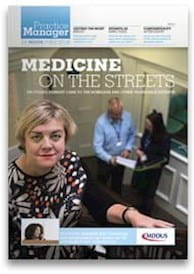Day one
A 72-year-old widow – Mrs T – has been unwell for four days with cough, congestion and fever. Her son is worried and takes time off work to look in on her. Mrs T is normally fit and active, spending most days in her garden or at her local bowling club, but on this morning she is still in bed looking pale and weak. Mr T phones the local GP surgery and speaks to a receptionist. He explains that his mother has a chest infection and wonders if she might need an antibiotic. The receptionist replies that there is a “viral flu” going about and the practice was not giving out antibiotics. She says it usually lasts about three days but when Mr T tells her that his mother had been unwell for longer she replies: “See how she is in the morning and then give us a ring back”. Mr T repeats that he is really quite worried about his mother’s condition and asks whether it might be best to take her to A&E. The receptionist replies “not really” as the hospital is also not handing out antibiotics for viral infections.
Day four
Mr T phones the surgery again to say that his mother is no better. A GP – Dr K – sees her at home that evening. Mrs T is complaining of left-side chest pain on moving or coughing, such that she cannot clear the phlegm in her throat. She finds it difficult to sleep but seems well hydrated. Dr K finds the chest sounds are okay on auscultation but with transmitted bilateral rattling though no audible pleural rub. He diagnoses possible lower respiratory tract infection and prescribes amoxicillin and co-codamol, and advises Mr T to get back in touch if there is any change or deterioration in his mother’s condition.
Day six
Early on Monday morning Mr T phones the surgery again to say his mother seems worse. The receptionist tells him that they need to give the antibiotics time to “kick in” but in the afternoon he phones again to say his mother is now very poorly. That evening she is seen at home again by a locum GP – Dr P. Mrs T’s temperature is raised and her BP is 200/84. The GP detects reduced right breath sounds and dullness. He arranges for an ambulance to A&E. She is admitted to hospital and placed on IV antibiotics.
Day eight
Mrs T’s condition worsens and that evening she collapses on the ward and dies from cardiac arrest.
~
A FEW months later a formal letter of complaint is received in the surgery from Mr T. He expresses dissatisfaction with the way his mother was treated by the practice. In particular he questions how a receptionist was allowed first to diagnose a viral infection over the phone and then judge that an antibiotic was not necessary. He also questions why in a later phone call to the surgery he was advised by the receptionist to give the antibiotic time to “kick in” when in fact his mother was seriously ill and in need of hospitalisation.
Mr T states that he now finds it personally distressing that he did not demand more urgent treatment for his mother and he has been left wondering whether, if he had done so, would she still be alive today.
The practice manager phones MDDUS and is given advice on how to respond to the complaint. First she is urged to acknowledge the complaint immediately, expressing condolences on his loss and informing Mr T that an investigation will be undertaken and specifying when a response can be expected.
A significant event analysis is undertaken by the PM and the receptionist answering both calls is identified and interviewed. She is reminded that receptionists should never take it upon themselves to offer advice to patients or family unless that instruction has come directly from a doctor or practice nurse. The PM raises the issue again in the weekly practice meeting and reminds all staff that they must work within their limits of competence.
The PM composes a letter of response expressing regret for the cause of the complaint and setting out the findings of her investigation into the matter. She explains that the receptionist in question has been spoken to about the incident and the importance of always deferring any advice on clinical matters to experienced and qualified members of staff. She also states that standard practice policies have been amended to highlight the issue and ensure that it does not happen again in future.
The PM offers to meet with Mr T to further discuss the matter if he wishes and she also explains how he can take his complaint further if not satisfied with the practice response – providing contact details for the health ombudsman.
KEY POINTS
- Ensure that all staff realise the importance of working within the limits of their competence.
- Make sure non-clinical staff are clearly aware that all clinical judgements must be deferred to doctors or other qualified staff.
This page was correct at the time of publication. Any guidance is intended as general guidance for members only. If you are a member and need specific advice relating to your own circumstances, please contact one of our advisers.
Read more from this issue of Practice Manager

Save this article
Save this article to a list of favourite articles which members can access in their account.
Save to library
